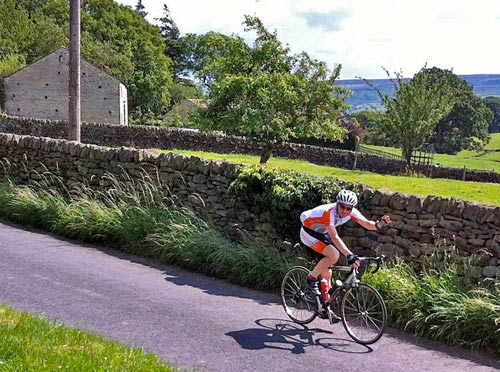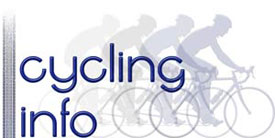Most very keen cyclist will have had those phases of trying to improve as quickly as they can. It is easy to be impatient and increase the intensity and duration of cycling too quickly; if you’re not careful this can lead to over-training. Though, I was given a clean bill of health following recent ‘chest pains issue‘. It is always worth being aware of the warning signs of overtraining.
Firstly, it is worth classifying different levels of fatigue a cyclist may feel:

The best way to avoid overtraining – make sure you keep your enthusiasm and enjoyment of cycling. There are no prizes for running yourself into the ground.
Levels of Tiredness
- Tiredness after long ride. You should feel tired after long ride.
- Bonking during ride. Running out of glycogen stores can lead to precipitous fall in energy levels leaving you crawling along. This is essentially a fault of insufficient food intake on that particular ride. Though be careful, it can cause problems to frequently run on insuficient fuel.
- Over-reaching – Intense training. The principle of training is – stress and recovery. When you train, you damage your muscles, forcing them to regrow stronger. In some training periods, you will be stretching yourself, pushing yourself past your comfort zone. In the short-term, this can reduce your performance. Without this over-reaching, you will not reach your potential. At some stages in the training cycle, you will need these kind of hard weeks. The ideal is to over-reach 3-4 weeks before a major event, and then start to taper to reach your optimal performance.
- Over-training. This is defined as a state of over-exhaustion leading to long-term and debilitating fatigue. When you have been over-trained, your body is so fatigued it can’t recover properly – even if you have 1 or 2 days rest.
- Chronic Fatigue – illness. Where an athlete suffers illness as a result of damaged body.
Symptoms of Overtraining
- Change in Mental Attitude. – General fatigue, lack of enthusiasm for cycling, listlessness. This is first and most obvious sign of over-training. It can be missed by those actually going through it. But, if going training on the bike becomes a chore, if there is no enthusiasm but reluctance to train, it is a strong sign that there is something wrong. Even if there are no obvious physical symptoms, a change in mental attitude still needs to be addressed.
- There can also be a lack of interest expressed in any other topic apart from cycling (though not to be confused with obsessive cycling syndrome, which is another kind of problem!)
- Max Heart beat 10% below race effort. If your maximum heart rate is 10% your usual race heart rate, then this is a sign the body is struggling to train hard. This is easiest to measure if you do time trial type efforts. But, you may notice it, if you simply can’t maintain any intensity during climbs.
Note: your heart rate can vary due to other factors too. For example, if you do a time trial on a cold early monring, it can easily be 10% lower becuase of this climatic factor and not necessarily over-trainining. - Related to poor heart rate, is a feeling of fatigue and stiffness in muscles. Even after a lengthy warm up, your muscles feel unresponsive.
- Raised resting heart-rate. If your resting heart rate is 10% above your usual resting heart rate for several days, this is another sign the body is over-trained. Again, you might get the odd raised day for a variety of reasons. But, if there is a pattern over a week, this is a sign of over-training.
- Propensity to minor illnesses. An overtrained athlete will be more vulnerable to minor colds, sore throats e.t.c.
- Need for extra sleep. Hard training may add an extra half an hour or full hour onto your usual sleep. This is not something to be concerned about. But, if you feel very tired at unusual times of the day, such as 10am or if you feel tired after sleeping, this is not a good sign.
- Decrease in body weight
Evaluation
- To some extent, symptoms of over-training take a degree of knowledge about your own body. There is a difference between the tiredness from a good hard ride, and the listless tiredness and mental fatigue of over-training.
- A super determined athlete is used to pushing away pain, so they can be susceptible to pushing away feelings of extreme tiredness.
- A training diary is useful as a guide to evaluating overall changes in performance and attitude.
- The most vulnerable cyclists to over-training are often new racers who have tremendous enthusiasm and lack of experience in listening to the their body. But, equally it can occur to seasoned cyclists, who are determined to keep chasing targets within their pre-set time limits.
- Any athlete needs to remember, recovery is as important as training. It is the recovery which makes you faster. Obree’s training book is good on this. Obree used to take upto 4 days of recovery between training sessions – I know many cyclists (including me, who would struggle to have discipline to take so many recovery days)
- There is no set mileage / time which will cause over-training. When I first started cycling, a 30 mile training ride could cause great fatigue. After several years of cycling, a 30 mile ride can be a nice recovery ride which helps me feel fresher the next day. Don’t make mistake of following what some-one else does, training and over-training will be very individual.
- The most important point is to continue to evaluate how you feel overall. As long as you have enthusiasm, balance and an ability to step back and look at bigger picture, you should be able to prevent overtraining.
- Make sure you are always enjoying your cycling, that will help prevent a lot of overtraining.
Causes of Over-training
- Doing too much too soon
- Poor / inadequate diet
- Mineral deficiency, e.g. Iron
- Lack of sleep
- Persistently high intensity
- Lack of proper recovery days and recovery weeks in the program

You’ve buggered up your link to the Graham Obree book review.
cheers Al Bo, have fixed link.
I can add another symptom which I have when I overtrain myself. I can’t sleep. I fall asleep very difficult and when I am asleep I wake up really easy.
Besides from cycling I really like lifting weights. So I overtrain my self often
Another great article, very comprehensive. One of the bonuses of all this summer’s rain has been the enforced rest days, especially on the commute (I don’t mind getting wet, I just don’t like cleaning the bike afterwards!). Anyhow, I’ve noticed my times around familiar courses have been smashed this year, most of which I think is due to the rest days. Avoiding junk commuter miles leaves me feeling much fresher for the proper big efforts of intervals, long days and hill training. Of course, when the sun comes back out, the challenge will be resisting the urge to 100% those commutes and take days off!
I’m glad the monsoon season has brought its benefits. THough I think I’d rather be overtraining in the sun, than peaking in the wet!